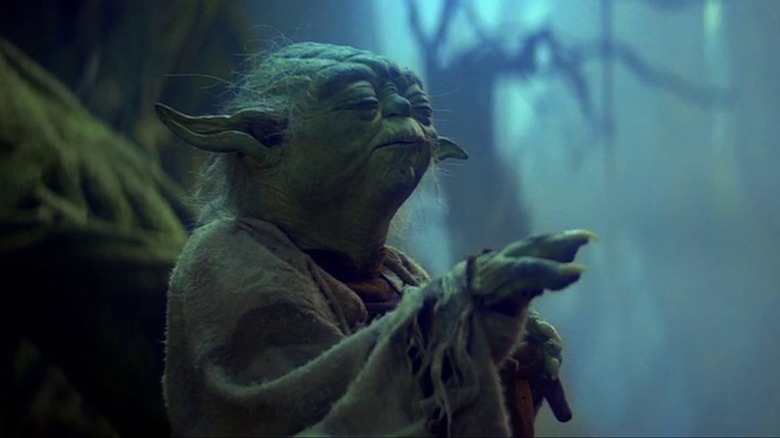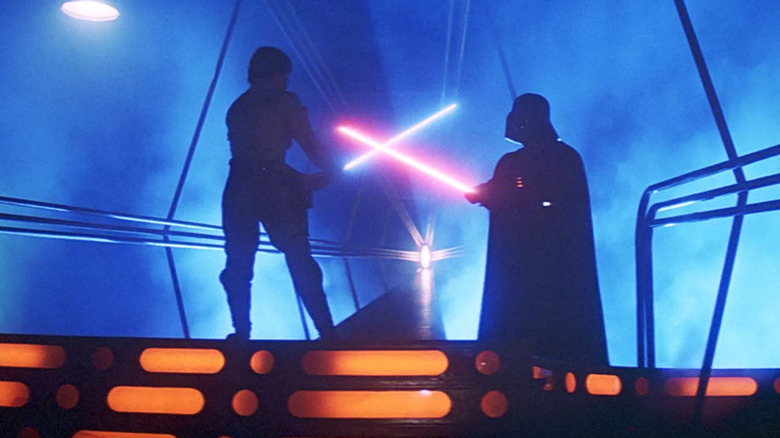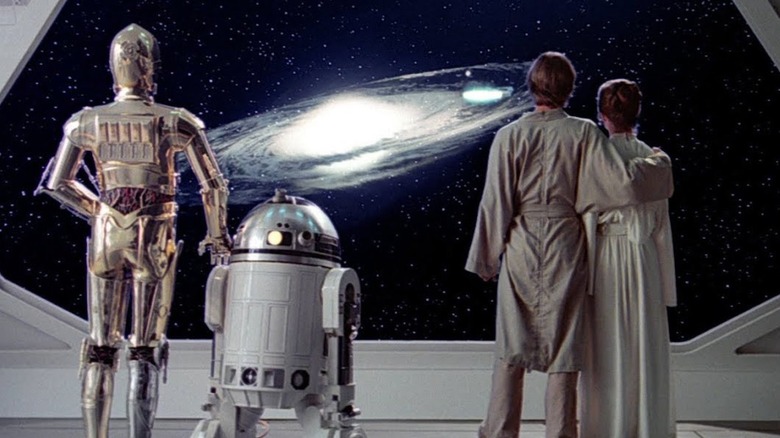Why The Empire Strikes Back Was Irvin Kershner's First And Final Star Wars Film
We will probably never see a motion picture phenomenon like George Lucas' "Star Wars" ever again. The United States was still shaking off its Vietnam War hangover in the mid-1970s, and while the top filmmakers of the New Hollywood were mostly attracted to edgy material that explored its characters' damaged psyches (and, to varying metaphorical degrees, the country's), audiences were in the mood to escape. Steven Spielberg's "Jaws" offered emphatic proof of this mindset during the summer of 1975 when it briefly became the highest-grossing movie in U.S. box office history.
Lucas' space opera was an altogether different kind of sensation. The briskly paced yarn about a young farm boy who discovers he might be the galaxy's savior ignited the imaginations of kids the world over, and Lucas deepened the viewer's immersion by employing an array of pioneering special effects and wildly inventive creature/production designs. "Star Wars" was world-building on a scale that matched "The Wizard of Oz," and it instantly became just as beloved.
Obviously, Lucas had to mount a sequel, but after getting pulled in dozens of different directions while making the first movie, he opted out of helming its follow-up so he could be more available to all of the units integral to assembling this massive production.
So he turned to Irvin Kershner, a highly respected journeyman director who'd taught Lucas at USC film school. From the outside, it looked like an odd choice, but Lucas had very good reasons for hiring his former instructor. And when Kershner was asked to return for the third movie, he had very good reasons for turning the gig down.
Lucas didn't think Kershner was Hollywod
Kershner wasn't even sure he wanted to direct what would become "Star Wars: Episode V – The Empire Strikes Back." When Lucas offered him the job over lunch in 1978, Kershner asked, "Of all the younger guys around, all the hot shots, why me?" Lucas' reply: "Well, because you know everything a Hollywood director is supposed to know, but you're not Hollywood."
Take a look at Kershner's early credits, and they're pretty Hollywood. He made his feature debut on the Roger Corman-financed crime flick "Stakeout on Dope Street," then split time between movies and episodic television (on shows like "Ben Casey," "The Rebel" and "Naked City"). Starting in the mid-1960s, he began working on high-profile projects like "A Fine Madness" (starring Sean Connery) and "The Flim-Flam Man" (featuring George C. Scott).
He made two fascinatingly understated comedy-dramas in the early 1970s with "Loving" and "Up the Sandbox," but when the latter flopped despite the star power of Barbra Streisand he tried to play it safe with "S*P*Y*S," a dire, critically panned comedy that attempted to recapture the counterculture magic of "M*A*S*H" with its stars Elliott Gould and Donald Sutherland. Kershner then retreated to "The Return of a Man Called Horse," a ho-hum sequel to Richard Harris' 1970 Western hit.
Kershner was about to bounce back commercially with the stylish American giallo "The Eyes of Laura Mars," and it's intriguing to wonder if, had that film been released before Lucas came calling, he would've turned his former student down flat. Given how important he was in giving the series the spiritual depth that sustains it to this day, I'm thrilled he came on board — and so was he! So why didn't he ever return to the galaxy far, far away?
An offer Kershner wishes he hadn't refused
In a 2000 interview with Star Wars Insider, Kershner revealed that it was largely a matter of timing. As he told Insider:
"[I]t was in the middle of filming, and I said, 'I don't think I'd be interested.' It was so difficult and I didn't want to get classified, because there are different kinds of films I wanted to do, like the one I'm working on now. But I wish I had done it because I felt I could've done something wonderful with ["Star Wars: Episode VI – Return of the Jedi"] ... It didn't come off as well as I would've liked, but it did very well, so what the hell. But yeah, I regret it. I should've, you know, if he was serious, if George really wanted me, I think I should've done it."
Did Lucas come calling when he commenced work on the Prequel Trilogy in the late 1990s (we know he asked playwright David Hare to direct the actors on "Star Wars: Episode I – The Phantom Menace")? In 2000, Kershner couldn't see it happening. Per the filmmaker:
"[I]'m sure that everyone considers me too old for that kind of thing. But I know I could do a great job. I know I could do the next one — and fantastically, I would put more humor into the next one, much more humor."
More humor, not of the Jar-Jar Binks kind, would've been a godsend in those installments. A sense of humanity would've also been nice. In any event, Lucas and the "Star Wars" universe were lucky to have Kershner. He is sorely missed.


